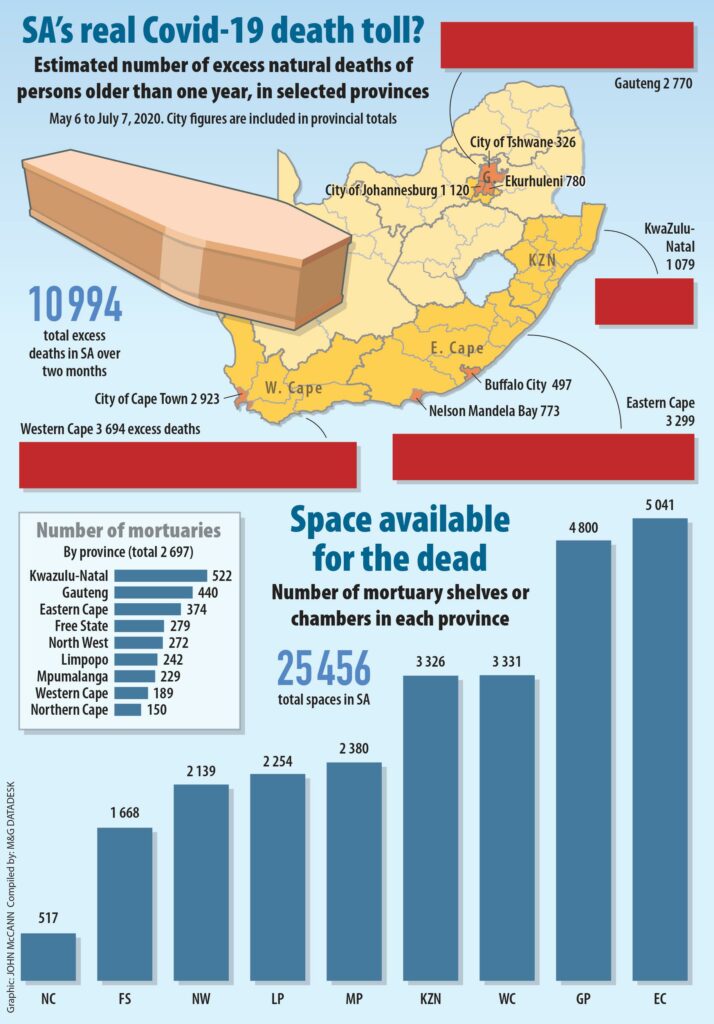Confusion about Gauteng’s Covid-19 gravesite preparations shocked the nation last week.
Confusion about Gauteng’s Covid-19 gravesite preparations shocked the nation last week. It turned out that the figure of 1.5-million graves referred to the province’s total burial capacity and was not an indication, as many first assumed, of an expected surge in Covid-19-related deaths.
However, the Mail & Guardian’s survey of five of the worst-hit municipalities — the City of Cape Town, the City of Johannesburg, Ekurhuleni, Buffalo City and the City of Tshwane — found that all are knuckling down to prepare for more deaths.
Nelson Mandela Bay did not respond in time to the M&G’s query. The City of eThekwini in KwaZulu-Natal refused to respond.
The municipality’s spokesperson, Msawakhe Mayisela, said he would not “attend to questions that would create panic. Currently we are preoccupied with flattening the curve.” With more than 14 000 confirmed cases, eThekwini is the epicentre of the virus in the province.
As Gauteng Health MEC Bandile Masuku pointed out last week, when he attempted to clarify the 1.5-million graves blunder, one of the stages in South Africa’s Covid-19 response relates to “bereavement and its aftermath”. This includes expanding burial capacity.
A statement by Masuku’s department noted: “We understand the subject of death is an uncomfortable matter to engage in. However, ensuring that there is adequate burial space in the province, unfortunately, forms part of the reality government must contend with in the battle against Covid-19.”
South Africa’s Covid-19-related deaths have, up to now, been comparatively lower than the rest of the world. In his address to the nation on Sunday, President Cyril Ramaphosa pointed out that the country’s case fatality rate of 1.5% “is among the lowest in the world”. This is compared to a global average case fatality rate of 4.4%. By Wednesday, there were 4 346 Covid-19-related deaths in South Africa.
According to a recently published report by the South African Medical Research Council the number of deaths of persons above the age of one from any cause “is significantly higher than the predicted number based on historical data, and continued to increase in the week ending June 30 2020”.
Between May 6 and July 7, there was an excess of 10 994 deaths from natural causes. Data shows that the estimated excess natural deaths were in the City of Cape Town (2 923), the City of Johannesburg (1 120), Ekurhuleni (780), Nelson Mandela Bay (773), Buffalo City (497) and the City of Tshwane (326).
 (John McCann/M&G)
(John McCann/M&G)
In the case of the City of Cape Town, which saw the first big wave of Covid-19 infections, expanding its cemeteries could provide 15 000 more burial blocks.
The city’s mayoral committee member for community services and health, Zahid Badroodien, told the M&G this week that, during a normal month, the city’s cemeteries and crematoriums accommodate about 1 200 burials and 360 cremations. However, during the current period, in addition to this capacity, about 3 800 more burials and 800 more cremations can be accommodated monthly.
According to the National Institute for Communicable Diseases, people who die of Covid-19 should be cremated. If cremation is not possible, burial must follow strict procedures. Burial heightens the risk of contamination.
The department of health also “highly recommends” cremation. But data from all the municipalities show that South Africans tend to choose burials over cremation. This could be because of religious and cultural funeral rites. In Islam, for instance, cremation is a taboo. The NICD weighs this factor up in its guidelines.
“While the demand for burial and cremation of Covid-19 victims is still manageable, the city is preparing individual graves to ensure a dignified service for families as fatalities increase,” Badroodien said.
The City of Johannesburg already has a burial capacity that will accommodate 1 384 000 bodies. The current burial capacity, City spokesperson Mlimandlela Ndamase said, “can handle any eventuality”.
He explained that the City of Johannesburg has already planned for “disaster”.
In a presentation on its Covid-19 response plan in May, the city told Parliament’s co-operative governance portfolio committee it had identified 517 hectares of burial space.
City of Ekurhuleni spokesperson Themba Gadebe told the M&G that the municipality has identified 30 hectares of land “for mass burials, should it occur”.
Last month Ekurhuleni mayor Mzwandile Masina told Parliament that the municipality was looking to increase its burial capacity from about 81 000 to 100 000. “We are busy sourcing the land [for mass burials]. We have identified some of the future pieces [of land] that can be used as cemeteries. And our planning team is now hard at work to ensure that we are ready,” Masina said.
According to Gadebe, however, the municipality’s two crematoriums are not operational. The municipality is in the process of refurbishing them and is considering building new ones.
Buffalo City’s grave site preparations are extensive. People travel to the Eastern Cape for funerals, a factor that has stoked the spread of the virus in the province.
According to a status report seen by the M&G, the municipality has already identified extensions of its existing cemeteries that will make space for 6 500 new graves. This is on top of a recent extension of the Haven Hills Cemetery, which opened up 10 000 more plots. The municipality has also identified four more cemeteries that could be extended.
City of Tshwane spokesperson Selby Bokaba said the municipality started to prepare for the eventuality of mass burials in the past month, when Covid-19 cases in Gauteng began rising exponentially.
According to Bokaba, the city has enough space for burials and is currently busy determining layouts to ensure capacity in this regard. The city has about 177 hectares of land for burials.
Last week, Masuku visited a grave site in Honingnestkrans, north of Tshwane, that will have a burial capacity of about 24 000. The Honingnestkrans site has more capacity than any other in the municipality.